
Many salad dishes often include kiwi but does it have a place on your daily meal plan? Many research studies suggest that kiwi has a strong nutritional value and provides many health benefits.
About Kiwi
Kiwi or Chinese gooseberry is a small fruit, typically brownish-green in color and about the size of a hen’s egg. The skin of the fruit is covered with soft fuzz and when it is sliced, you will see the edible black seeds on it. Typically, it looks like a little melon. The taste of this fruit can be hard to describe. The taste of this fruit is like a strawberry while its texture suggest a hint of banana.
In the ancient times, kiwi is known as Yang Tao in China. It has long been heralded for its medicinal properties. It was introduced in New Zealand in the late 1960s where it was first known as Chinese gooseberry. Later on, the fruit got its new name, “kiwi”, in honor of New Zealand’s native bird. The various health benefits of kiwi have spread all around the globe and it was widely cultivated. Some of the countries known for the high production of kiwi are Italy, Chile, France, Japan, and the U.S.
Nutritional information
Kiwi is a humble superfood that is packed full of vitamins and minerals that are essential for the body. It contains very high amount of vitamin C, an average sized kiwi provides 1.5 times of the recommended daily intake. It will provide 2 grams of fiber and provides 89% daily value of vitamin K. It is also a great source of vitamin A, E, B6, folate, copper
Kiwi as a superfood
Kiwi offers tons of benefits such as a reduced risk of heart diseases, diabetes, cancer and obesity. However, one of the most important benefit you can reap with this fruit is it has the ability to improve your sleep quality and sleep quantity. According to a study conducted to both men and women between the ages of 20-55 that were all experiencing a disrupted sleep, found that those who ate 2 kiwi fruit an hour before bed for a duration of 4 weeks, have shown significant improvement to different measures of sleep. The data was collected using sleep diaries, standard-quality questionnaire, and wristwatches that measured the aspect of sleep quality and quantity. The study showed:
Sleep onset latency (the amount of time it takes to fall asleep after going to bed) decreased by 35.4%. This means that people who were consuming kiwi fruit fell asleep quickly than those who did not.
The amount of time spent in periods of wakefulness after initially falling asleep decreased by 28.9%.
The quality of sleep was improved. The data was measured based on the sleep quality questionnaire, where lower scores means better sleep.
In the aspect of sleep efficiency (a measurement of the amount of time spent on actually sleeping compared to the total amount of time spent in bed increased by 5.41%.
In the overall sleep quality and quantity, the amount of total sleep time in people who were offered kiwi fruit before bedtime increased by 13.4%.
Conclusion
Many research studies have proven that kiwi fruit is a sleep-promoting superfood and it is the antioxidants along with its high serotonin levels that is behind the possible benefit of kiwi for sleep.
Check out some interesting tips from Sasha on how to improve your sleep patterns. Very effective, and not the routine tips you’ll find on a daily blog.
Enjoyed Kiwi: Superfood for Sleep?? Share it with your friends so they too can follow the Superfoodsliving journey.
Share on Pinterest
